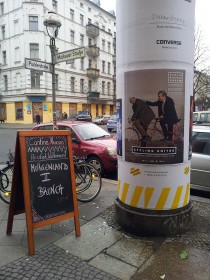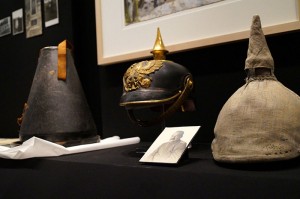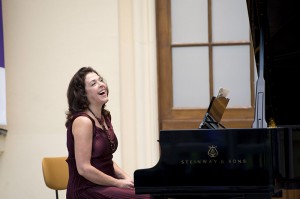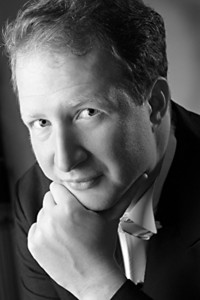Pessach is approaching – the festival of exodus and freedom. This year, there is less talk of having the festive meal at large community gatherings. It is obvious, although unspoken, that smaller gatherings in the home make more sense. We are becoming alienated from our community centers through fear. Keep a low profile. Don’t speak Hebrew on the streets. Some people are removing the mezuzah from their front doorposts, a traditional object that visibly identifies a Jewish household. There is a mood of caution and nervous apprehension.
How did it get to this point?

Advertisement with Imam Ferid Heider and Rabbi Daniel Alter for the “Cycling Unites”-Critical-Mass-Tour in Berlin on 22 March 2015, photo: Michal Friedlander
June, 2014
A drunken man rolls slowly off the train platform and plops onto the tracks at Friedrichstrasse station. Around sixty people witness the moment and look away, hoping that someone else will solve the stinky, awkward problem. And so it was. An Italian and an Israeli jumped down to haul the semi-conscious man to safety. The passengers walked around the startled little group, pressing forward to make the oncoming train.
July 2014
Dinner party small talk. The discussions nearest me are taking a more political turn and I am just not in the mood to talk about Israel. Too late. The young man next to me asks if I saw the recent pro-Palestinian demonstration on the Kurfürstendamm? He becomes very still and lowers his voice. → continue reading
Or: How 300 Artifacts from our Collection Were Turned into a Cabinet Exhibition about the First World War

Objects from our collections in the exhibition “The First World War in Jewish Memory”
© Jewish Museum Berlin, photo: Mariette Franz
Our exhibition “The First World War in Jewish Memory” opened last week. It is based primarily on collections donated to the Jewish Museum by German-Jewish families and each exhibit tells a very personal story.
In total, 176 exhibits were selected, researched and arranged as a visual narrative by eight curators, six restorers, two exhibition technicians, a translator and a graphic artist. So, even before I mention our numerous willing helpers in the wings, in particular the student assistants and the Museum caretaker, this sounds like a big team for a big exhibition. In fact, our joint endeavor culminated in a small cabinet exhibition relating to the First World War, which can be viewed until 16 November in the Rafael Roth Learning Center. → continue reading
An Interview with Elena Bashkirova
From 7 to 11 May, we will host a chamber music festival in the museum’s Glass Courtyard. Katharina Schmidt-Narischkin and Sylvia Winkler of our press office spoke in advance with the festival’s director Elena Bashkirova.
Press office JMB: As festival director, what themes have you chosen to emphasize this year?

Elena Bashkirova, festival director and pianist
© Monika Rittershaus
Elena Bashkirova: Our themes have been determined this year by two anniversaries: on the one hand, the start of the First World War 100 years ago and its impact on music; on the other hand, the 150th birthday of Richard Strauss. Both anniversaries augur a varied program for “intonations”: 1914 saw an astonishing richness of musical styles, which our concerts will reflect. And Strauss composed chamber music nearly his entire life, so I have a wide range of pieces and genres to choose from.
Every year at “intonations,” chamber music classics can be heard together with unknown works. What composers should visitors expect to discover in this third season?

David Robert Coleman, composer and conductor © private
Rudi Stephan was an extraordinary discovery for me. I heard Music for Orchestra and Violin a few years ago here in Berlin. I was impressed and deeply touched by it. As I was putting together the programs for “intonations,” I found his gorgeous chamber music and was delighted to have the chance to present it here with my colleagues. Rudi Stephan died in the war when he was 28. Given his talent, he would otherwise have certainly provided us with more outstanding music.
There will also be another world premiere: the fourth concert, on Saturday 10 May, will open with David Coleman’s “Three pieces for clarinet and piano.” Another significant composer this year will be Karol Szymanowski. He has his own tonal language, writing hauntingly beautiful music that unfortunately is played much too seldom. → continue reading



